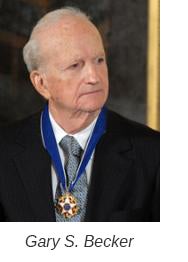Gary S. Becker Won 1992 Nobel Prize for Expanding the Microeconomic Analysis of Human Behavior
Gary S. Becker, an NBER research associate from 1957 to 1979, won the 1992 Nobel Memorial Prize in Economic Sciences for applying the principle of rational, optimizing behavior to areas in which researchers formerly assumed that behavior was habitual and often irrational. The award cited his work on such concerns as investment in human capital, marriage and childbearing, crime, and discrimination.
“Gary Becker applied economic theories and approaches to areas that had previously only been addressed in sociology, demography, and criminology,” the Royal Swedish Academy of Sciences said. “Becker's starting point was that actors act rationally to maximize specific goals, like advantage or wealth.”
Becker conducted much of the research for which he won the prize while he was an NBER research associate, during which time he wrote Human Capital: A Theoretical and Empirical Analysis with Special Reference to Education, A Treatise on the Family, and, with William M. Landes, Essays in the Economics of Crime and Punishment.
At the time of the award, Becker was University Professor of Economics and of Sociology at the University of Chicago.
More information on this Nobel laureate



